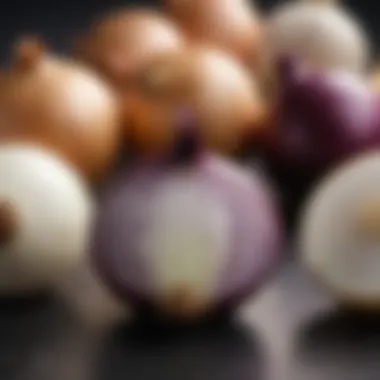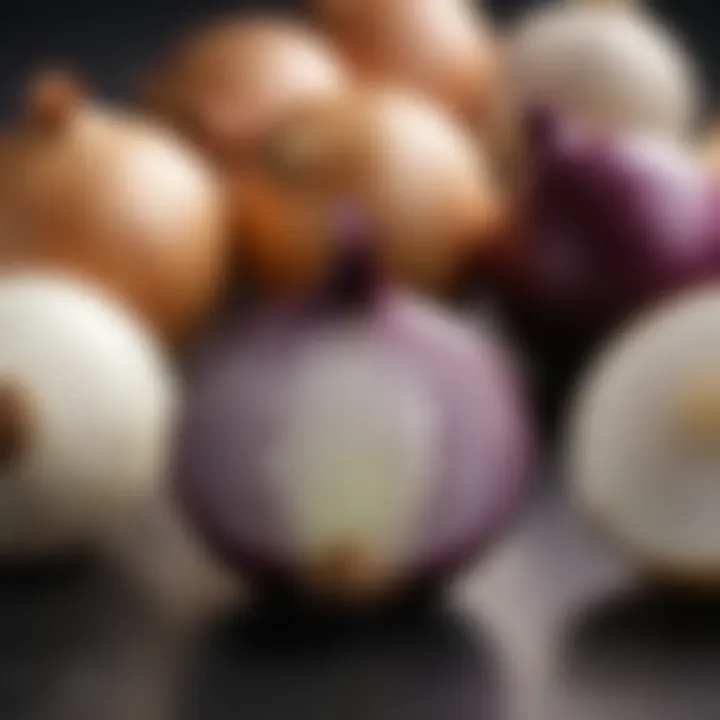Exploring the Gin Martini with Onions: A Culinary Perspective


Intro
The gin martini, a classic cocktail, has been a staple of sophisticated drinking for decades. Its elegance often evokes a sense of nostalgia, yet the incorporation of unconventional ingredients can elevate the experience to new heights. One such unexpected addition is onion, which offers a unique twist on the traditional gin martini. This article explores the intriguing blend of flavors, historical context, and preparation techniques involved in creating this distinctive drink. For culinary enthusiasts, understanding this fusion provides an opportunity to enhance their mixology skills and broaden their cocktail repertoire.
Recipe Overview
Brief Description of the Dish
The gin martini with onions presents a flavorful exploration that juxtaposes the crisp characteristics of gin with the savory undertones of onions. The interaction between these elements leads to a cocktail that is not only refreshing but complex, inviting both novice and seasoned drinkers to see the martini in a new light.
Key Ingredients
- Gin: Choose a high-quality gin, such as Tanqueray or Bombay Sapphire, known for their botanicals and flavor profiles.
- Dry Vermouth: This adds a touch of herbal notes to the cocktail. Options like Noilly Prat or Dolin work well.
- Onions: Select small pickled onions, often called cocktail onions, as they contribute tanginess and depth.
- Ice: Essential for chilling the cocktail and keeping it crisp.
- Olive or lemon twist (optional): A garnish choice that can complement the drink’s flavor.
Preparation Guidelines
Step-by-Step Instructions
- Chill your glass: Start by placing the martini glass in the freezer or filling it with ice water.
- Mix the ingredients: In a mixing glass, combine 2 ounces of gin with 1/2 ounce of dry vermouth.
- Add ice: Fill the mixing glass with ice, ensuring the desired chilling effect occurs without watering down the drink.
- Stir: Use a bar spoon to stir the mixture gently for about 30 seconds, allowing for the right dilution.
- Prepare the glass: Remove the chilled martini glass from the freezer or discard the ice water.
- Strain the mixture: Using a strainer, pour the cocktail into the prepared glass.
- Add the onion: Instead of an olive or twist, drop a pickled onion into the drink for a delightful surprise.
- Serve immediately: Enjoy the cocktail while it retains its refreshing qualities.
Preparation Tips and Tricks
- Adjust vermouth levels: Experiment with the amount of vermouth to find your ideal balance between herbal and gin flavors.
- Choosing the right gin: Different gins will impart various botanical notes. Consider trying a local craft gin for a unique spin.
- Garnish with intention: Pair your onion with complementary flavors like a lemon twist for added brightness.
"The beauty of the gin martini with onions lies in its ability to challenge perceptions and redefine classic tastes."
This guide offers culinary lovers a pathway to elevate their cocktail game. With proper technique and ingredient selection, one can create a martini that impresses and delights.
Preface to Gin Martinis
The gin martini stands as a pillar in the world of cocktails, serving as a symbol of sophistication and an integral part of bartending culture. It embodies a blend of tradition and modernity, appealing to both the novice and the seasoned enthusiast. Its simple ingredients belies the complexity of flavors that can be achieved. In this article, we will delve into the intriguing combination of gin martinis and onions, revealing the nuances that can elevate this classic drink. Understanding the foundation of the gin martini is essential, as it lays the groundwork for exploring the unique addition of onions.
Defining the Gin Martini
A gin martini is traditionally defined by its key components: gin and dry vermouth, garnished typically with either an olive or a lemon twist. The balance of these ingredients can vary widely, from a gin-forward ratio to a wetter concoction with more vermouth. The choice of gin plays a crucial role; different styles of gin can greatly alter the flavor profile of the cocktail. Distilled spirits have undergone an evolution, adding to the intricate world of gin martinis. An understanding of these aspects is vital. Crafting the perfect martini requires knowledge not only of the ingredients but also of techniques and presentation.
Historical Origins
The gin martini's origins are somewhat shrouded in mystery, with multiple anecdotes claiming its inception. The drink is believed to have roots dating back to the late 19th century, where it gained popularity in social settings. Bartenders experimented with various spirits and mixers, leading to the martini as we know it today. Some records suggest that it was first popularized in the United States during the Prohibition era as a means to mask the taste of lower-quality gin. Additionally, its portrayal in film and literature has cemented its place in cultural history. Understanding these historical contexts not only enriches the appreciation of the drink but also informs how variations, such as those incorporating onions, came into being.
Onions in Cocktails
Onions may not be the first ingredient that comes to mind when considering cocktails, but they serve a unique purpose in the world of mixology. As essential elements in cocktail crafting, onions can elevate flavors and introduce a savory profile that is often overlooked. This section delves into the significance of using onions in cocktails, particularly in the context of gin martinis. The inclusion of onions lends depth and complexity to this classic drink, making it not merely refreshing but also umami-rich.
The Role of Onions in Mixology
Incorporating onions into cocktails adds a layer of flavor that can distinguish a drink from others. Onions bring not only their distinctive taste but also their aromatic qualities, which can enhance the overall sensory experience of the cocktail. They often serve as a garnish, but they can also be muddled or infused to extract their full range of flavors.
There are several varieties of onions, such as red, white, and shallots, each offering different flavor notes. Red onions tend to have a sweeter taste and vibrant color while white onions provide a sharper, more pungent punch. Shallots, being milder, may offer a subtler approach. Bartenders may experiment with these different types to find the best match for their gin martini. The versatility of onions provides many options when crafting cocktails that aim to harmonize with gin and other ingredients.
Flavor Profiles and Pairing
The interplay of flavors in cocktails is crucial for creating a well-balanced drink. Onions can contribute a savory element to balance the botanicals in gin. The combination of gin's herbal notes and the sweetness of onions creates a multifaceted flavor profile. When pairing these elements, consider these factors:


- Bitterness: A dry gin can contrast nicely with the sweetness of onions, creating a delightful balance.
- Herbaceousness: Many gins feature botanical flavors such as juniper, rosemary, or thyme. A garnish of onion can highlight these herbal notes.
- Acidity: Adding a splash of vermouth or citrus juice can enhance the overall tartness, complementing the richness provided by onions.
When selecting gins for a martini with onions, one should consider those that have a robust and complex flavor profile. The right onion, cut and prepared properly, can uplift and refine the spirit, resulting in an enriching cocktail experience. The art of mixing lies in the perfect balance.
As one explores this unique integration of onions into cocktails, it opens up new pathways for creativity in drink crafting. The next sections will focus on the process of selecting the right gin and the preparation methods to master this unconventional cocktail.
Choosing the Right Gin
Choosing the right gin is a fundamental aspect of crafting a gin martini with onions. The choice of gin significantly affects the drink's overall flavor profile and the way it interacts with the onions. Different gins have various botanical compositions, and understanding these nuances allows for better customization of the drink. An ideal gin should complement the unique sharpness of onions while still delivering the crispness and refreshing qualities expected from a martini.
When selecting gin, consider the following elements:
- Flavor Profile: Look for gins that offer a balance of juniper and other botanicals. This balance enhances the overall experience.
- Quality and Purity: High-quality gins made with natural ingredients not only provide better taste but also result in a smoother finish.
- Personal Preference: Ultimately, your own taste preferences should guide your choice. Experimenting can reveal exciting flavor combinations.
Incorporating these considerations ensures your gin martini is not only enjoyable but also a true expression of your mixing abilities.
Exploring Different Gin Varieties
Gin comes in several varieties, each with distinct characteristics that impact the final cocktail. Here are some of the most common types of gin:
- London Dry Gin: Known for its strong juniper flavor, this type is a classic choice for martinis. It usually has a more straightforward taste, allowing other flavors to shine through.
- Plymouth Gin: This variety is slightly sweeter than London Dry and has a unique earthy flavor. Its slightly fuller body suits those who prefer a richer experience.
- Old Tom Gin: With a hint of sweetness, Old Tom adds depth to cocktails without overpowering them. It can be interesting when paired with the savory elements of onions.
- Craft Gin: Often small-batch produced, craft gins tend to have innovative flavor profiles. They can contain unusual botanicals, which may enhance the complexity of the gin martini.
Exploring these gin options allows you to discover the particular flavor notes that work best with the nuanced profile of onions.
Craft Gin vs. Traditional Options
The debate between craft gin and traditional options centers on creativity versus heritage.
Craft Gin: Craft gin has surged in popularity over the last decade, emphasizing artisanal production methods and unique flavors. Small distilleries often experiment with unconventional botanicals, offering new and unexpected flavors. When using craft gin in a martini, you may achieve distinct notes that can complement or contrast with the onion flavors. However, it is essential to choose craft gins with balanced botanical profiles to avoid overwhelming the onion flavor.
Traditional Gin: Traditional options, such as London Dry, maintain a strong heritage in gin production. These gins usually feature a prominent juniper flavor and have been time-tested in cocktails. Choosing traditional gin can provide consistency in flavor and experience. For those unfamiliar with the nuances of gin, sticking to traditional varieties might be a safer pathway toward crafting a balanced gin martini with onions.
Each option has its merits. The right selection ultimately depends on your taste and the experience you wish to create. Consider the complexity and how each style will meld with the other ingredients in the martini.
Preparing the Gin Martini with Onions
Preparing the gin martini with onions is a pivotal aspect of this article, focusing on the intricate details that create a distinctive cocktail experience. This section emphasizes the necessity of understanding the various components involved in crafting this drink, ranging from selecting the best ingredients to mastering the mixing techniques. A well-prepared gin martini not only showcases the quality of gin but also highlights the unique flavor that onions can bring. Culinary enthusiasts will find it beneficial to explore the depth of flavor and the layers of aroma that can be achieved through careful preparation.
Ingredients Needed
The choice of ingredients is crucial in determining the quality and taste of the gin martini with onions. There are a few key components that you must gather:
- Gin: Select a high-quality gin that aligns with your taste preferences. Some popular options include Tanqueray, Bombay Sapphire, and Hendrick's. Consider craft gins for unique botanical flavors.
- Dry Vermouth: A good dry vermouth complements the gin and enhances the overall profile of the cocktail. Brands like Noilly Prat or Dolin are recommended choices.
- Onions: Pearl onions are commonly used. Their size and mild flavor allow for a gentle infusion. Alternatively, you can use cocktail onions for a different touch.
- Ice: Use large ice cubes to chill the mixture without watering it down.
- Garnish: Optional but recommended, a simple twist of lemon can elevate the drink's aroma.
Mixing Techniques
The technique employed in mixing the gin martini plays a critical role in achieving the desired texture and flavor blend. Here are the steps:
- Chill your glass: Before beginning, chill your martini glass. Place it in the freezer or fill it with ice water.
- Combine ingredients: In a mixing glass filled with ice, pour two parts gin and one part dry vermouth. Adjust the ratio based on your personal preference.
- Stir gently: With a bar spoon, stir the mixture gently for about 30 seconds. This method ensures that the drink is chilled while maintaining its clarity.
- Incorporate the onions: If using pearl onions, muddle one or two gently in the mixing glass before adding vermouth. This allows their essence to mingle with the spirit.
- Strain: Use a cocktail strainer to pour the drink into the chilled glass, being careful to keep the muddled onions out.
Garnishing with Onions
Garnishing is the final touch that can elevate your gin martini with onions. Here are some suggestions:


- Onion garnish: You can use a skewer to thread one or two pearl onions and rest it across the rim of the glass. This adds a visual appeal and hints at the cocktail’s unique flavor.
- Twist of lemon: A lemon twist can add a refreshing citrus aroma, contrasting nicely with the savory notes of the onions.
Remember, the garnish should not overpower the drink. Instead, it should complement the overall experience, highlighting both gin and onion flavors.
Variations of the Gin Martini with Onions
The exploration of variations in the gin martini with onions is significant in the realm of mixology and culinary experiences. Each alteration can greatly affect the drink's flavor profile and overall enjoyment. By adjusting ingredients and experimenting with aromatics, the gin martini transforms into unique experiences tailored to personal preferences. Enthusiasts can find new dimensions in a classic cocktail which enhances its appeal to those seeking variety.
Adjusting Ingredients for Different Flavors
Adjusting the ingredients in a gin martini with onions can dramatically shift its taste. The choice of gin plays a critical role. Different gins offer various botanicals which can be highlighted through selected onions. For light and refreshing taste, use a London Dry gin. This type of gin often has strong botanical flavors, making it an ideal base for incorporating subtle onion notes. Conversely, for a more robust flavor, a navy-strength gin, which is higher in alcohol content, might be preferable. This choice ensures that the drink maintains its character, even with added ingredients.
Besides the gin, the style of onion also influences the final outcome. Standard cocktail onions provide a mild taste, while pickled onions can introduce a tangy twist.
"Experimenting with different types of onions can add unexpected layers to the martini, allowing for a personalized taste experience."
Negative space in cocktails is useful. By omitting or substituting one element, it is possible to create something unique. For example, a vodka substitute can be used to make a "gin and onion" variation, diversifying the classic recipe further.
As a general guideline, one could try:
- London Dry Gin with standard cocktail onions for a classic flavor.
- Navy Strength Gin with pickled onions for a powerful punch.
- Flavored Gins, like cucumber or lavender, with complementary onion options for something unconventional.
Incorporating Additional Aromatics
Incorporating additional aromatics into the gin martini with onions can enhance the drink's complexity. Aromatics can range from herbs to spices and even edible flowers. Consider adding a sprig of rosemary or thyme to introduce fragrant notes that harmonize with the botanical qualities of the gin. These small additions can create a multi-layered drink experience.
Another option is to explore flavored bitters. A few dashes of orange or celery bitters can add depth. The interplay of these additional flavors with onions can create a more intricate palate. When integrating these components, it's crucial to remain aware of balance. The goal is to enhance the drink, not overwhelm it.
Serving Suggestions
When it comes to the gin martini with onions, serving suggestions play a critical role in enhancing the overall experience of this unique cocktail. The presentation, glassware, and temperature at which the drink is served can greatly influence the perception of flavors and aromas. Understanding these elements ensures that the drink not only tastes good, but also looks appealing and feels right.
Glassware Choices
Selecting the right glass for serving a gin martini is essential. Traditionally, a martini glass is used, known for its elegant design and wide, shallow bowl. The shape of the glass allows for the aromatic qualities of the gin to be captured, while also providing enough surface area for garnishes.
Some other options may include:
- Coupe glasses: These have a wider bowl and a distinctive look. They offer a vintage aesthetic that appeals to some cocktail enthusiasts.
- Highball glasses: For those preferring a more casual presentation, a highball glass can be utilized. This gives a relaxed feel to the drink.
Using the correct glass also impacts the temperature retention. A well-chilled glass can help keep the drink colder longer, allowing it to be enjoyed at an ideal temperature.
Temperature Considerations
Temperature is another crucial factor in serving gin martinis, especially those with onions. The ideal serving temperature for this cocktail is typically between 5–7 degrees Celsius. A cold drink enhances the refreshing qualities of the gin and the crispness of the onion.
To achieve this temperature, consider the following techniques:
- Chilling the glass: Place the glass in the freezer or fill it with ice water for a few moments before pouring in the cocktail.
- Crisp gin: Ensure that the gin is stored in the refrigerator or freezer to contribute to the cocktail's chill.
Serving the drink too warm can result in tasting the alcohol more than the nuanced flavors of the botanicals in the gin and the subtle sweetness of the onions. Therefore, maintaining a cool temperature is integral to the overall experience of enjoying a gin martini with onions.
"A well-served gin martini not only looks appealing but also captivates the palate in the right way."


Cultural Impact of Gin Martinis
The significance of gin martinis transcends mere taste, tapping into deeper cultural narratives. This cocktail, particularly when infused with onions, represents more than just a beverage; it reflects social customs, artistic expressions, and evolving trends within our society.
Representation in Media
Throughout history, gin martinis have featured prominently in literature, cinema, and television. Their portrayal often embodies sophistication, leisure, and sophistication. Iconic characters, such as James Bond, have made the gin martini a symbol of the elite. In the famous phrase, "shaken, not stirred," this cocktail encapsulates not just a drink, but an entire lifestyle ethos.
Beyond fiction, various documentaries and series explore the craft of mixology, showcasing the intricate processes behind cocktail preparation. This representation serves to elevate the status of the gin martini, allowing it to transition from a simple drink to a culturally significant symbol. With the inclusion of onions, a traditionally disregarded ingredient, it also challenges conventions within mixology, stimulating discussions on creativity and culinary boundaries.
Contemporary Trends
Recent trends in mixology highlight a renewed interest in classic cocktails with a modern twist. The gin martini with onions is at the forefront of this movement. Bartenders and cocktail enthusiasts alike experiment with flavor profiles, seeking to bridge nostalgia with innovation. Ingredients that once seemed unconventional can now create exciting experiences for consumers.
Moreover, with the rise of craft cocktail bars, there is an increasing focus on artisanal spirits and fresh local ingredients. This trend aligns with the growing appreciation for flavor complexity, pushing the gin martini to evolve in taste and presentation. Additionally, consumer preferences shift towards cocktails that tell a story, and the inclusion of onions offers a new narrative—one that emphasizes sustainability and resourcefulness in the culinary world.
In summary, gin martinis, particularly those with onions, are not just beverages. They serve as cultural artifacts reflecting societal values and trends. Their portrayal in media contributes significantly to their mystique and allure, while contemporary trends reinvigorate interest in this classic cocktail, ensuring its relevance in modern drinking culture.
Health Considerations
Considering health in the context of cocktails is essential, especially when discussing alcoholic beverages like gin martinis. The balance between enjoyment and health is vital for both bartenders and enthusiasts alike. This section aims to address important aspects relating to moderation in alcohol consumption, as well as the potential health benefits associated with gin, particularly when using it in a gin martini with onions.
Moderation and Alcohol Consumption
Moderation serves as a cornerstone in enjoying alcoholic drinks responsibly. It is widely accepted that moderate alcohol consumption can contribute to a pleasurable sociable experience without leading to negative health consequences. The Centers for Disease Control and Prevention suggests that moderate drinking is defined as up to one drink per day for women and up to two drinks per day for men. For gin martinis with onions, adhering to this guideline becomes significant.
Here are several reasons why moderation is crucial:
- Health Risks: Excessive drinking can lead to a host of health issues, including liver disease, heart problems, and addiction.
- Cognitive Effects: Drinking in moderation helps maintain cognitive function and emotional well-being. Overindulgence can impair judgement and decision-making.
- Social Interactions: Drinking responsibly fosters positive social interactions, reducing the likelihood of embarrassing or regrettable behavior.
Staying mindful of these factors when enjoying a gin martini can contribute to an overall healthy lifestyle while still allowing for enjoyment of the unique flavors this cocktail has to offer.
Potential Benefits of Gin
Gin, particularly when consumed in moderation, can have some potential benefits. Understanding these may add another layer of appreciation as one explores the gin martini with onions. Here are some benefits to consider:
- Botanical Ingredients: Gin is distilled with various botanicals, which may include juniper berries, herbs, and spices. These ingredients can offer different health advantages, such as anti-inflammatory properties and antioxidants.
- Hydration: When mixed with tonic and consumed responsibly, gin can play a role in hydration, especially when paired with low-sugar mixers like soda water. Maintaining hydration is key for overall health.
- Low-Calorie Options: Compared to many other cocktails, gin martinis can be lower in calories, especially when opting for dry varieties. This can make them an attractive option for those mindful of their caloric intake.
Being aware of these health considerations may encourage culinary enthusiasts to explore the gin martini with onions within a healthier framework. As always, understanding one’s limits and enjoying responsibly is crucial for maintaining not only physical health but also a positive relationship with alcohol.
Final Thoughts
In concluding this exploration of the Gin Martini with onions, it becomes clear that this cocktail represents a unique intersection of tradition and modernity. As we have seen, understanding the nuances of both gin and onions can elevate the drinking experience significantly. Each component contributes distinctively to the overall flavor profile, encouraging enthusiasts to appreciate them in various contexts.
The discussion on preparation techniques and serving suggestions showcases the importance of details. From choosing the right glassware to considering temperature, creating the perfect Gin Martini with onions requires attention to various factors. Emphasizing these elements not only enhances taste but also enriches the overall experience of enjoying a cocktail.
Moreover, exploring the cultural impact of this beverage reveals its place in contemporary trends. Acknowledging how the Gin Martini with onions has been represented in media and popular culture allows for deeper appreciation of this drink beyond its taste. This perspective invites food lovers to recognize the broader implications of their culinary choices.
"A well-crafted cocktail is not just a drink; it is an experience that engages all the senses."
Recap of Key Points
- The combination of gin and onions in a martini offers a distinctive flavor that can be tailored to personal preferences.
- Historical context enriches the understanding of why this cocktail has emerged as a popular choice among aficionados.
- Proper preparation and presentation are crucial for maximizing the enjoyment of the Gin Martini with onions.
- Cultural aspects can significantly influence the perception and appreciation of this cocktail today.
Encouragement to Experiment
Experimentation is a vital part of mixology. As we have discussed, adjusting the ingredients in your Gin Martini can lead to exciting new flavors. Whether you prefer a sharper taste with a specific gin or want to add a twist with different onion varieties, the opportunities are vast.
Trying variations in garnishing or even incorporating additional ingredients can surprise your palate in a delightful way. Don't hesitate to use your taste preferences as a guide toward crafting the perfect cocktail. Each attempt can lead to a better understanding of the intricate relationship between flavors, giving you confidence in your mixology skills. The Gin Martini with onions is more than just a drink; it is an invitation to explore and redefine your cocktail experience.







